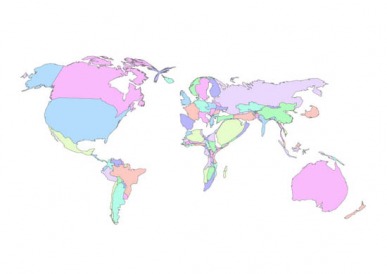|
This fascinating map (source here) highlights how much trouble the human species has feeding itself. If you are unfortunate enough to live in Africa or South Asia, you will struggle to consume sufficient calories to survive. If you are unfortunate enough to live in the United States, Canada, Australia, a handful of European countries, or a Gulf state, you will struggle to consume few enough calories.
Wouldn't it be great if developed economies could just ship off their excess calories and send them to calorie-deficient countries? Hey, don't eat that second donut-- FedEx it to India. We actually do this with clothing. Clothing that is donated to Goodwill or similar stores, but goes unsold, is baled and sold by weight to developing countries. I purchased some of it when I was in Dakar. It provides local consumers with inexpensive, good quality clothing-- but it also puts local textile workers out of business. Food, of course, is yet more complicated. Hungry people don't need your second donut so much as they need the protein- and vitamin-rich lentil veggie stew you SHOULD be eating. Many people who are calorie or vitamin deficient work in agriculture themselves, and they need not only food but a sustainable way to make a living. However, eating less would have the effect of lowering prices-- which would make food more affordable. And eating less junk food would lower demand for empty-calorie crops like sugar and corn, which might free up land for healthier crops. I think the main lesson from this map, however, is to remind those of us in the developed world how lucky we are to have the problems we have. Health care costs exploding because people are overweight and living longer? At least they aren't starving and dying of malaria as toddlers. So we have to push people to go to the gym? The fact that physical work is optional is a sign that we live luxurious lives. If we can't figure out how to keep our population healthy, what chance is there for developing economies, whose challenges are even more daunting?
0 Comments
Leave a Reply. |
About Liz
I have worked in economic policy and research in Washington, D.C. and Ghana. My husband and I recently moved to Guyana, where I am working for the Ministry of Finance. I like riding motorcycle, outdoor sports, foreign currencies, capybaras, and having opinions. Archives
December 2016
Categories
All
|

 RSS Feed
RSS Feed
